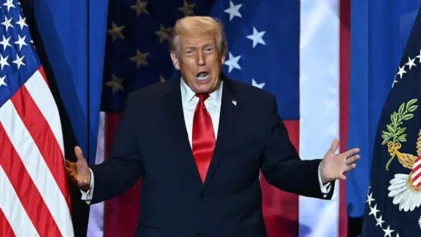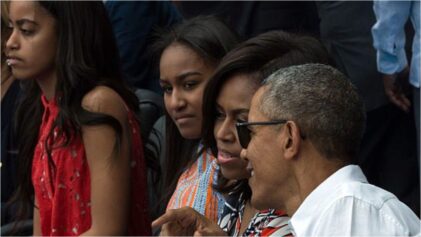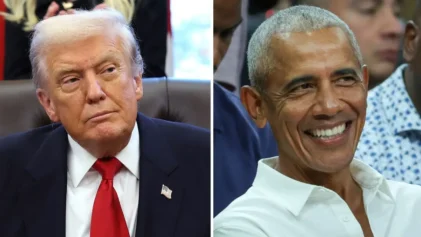President Obama used the commencement address yesterday at prestigious Morehouse College to deliver a powerful and personal appeal directly to black men. The president urged them to set an example for what it means to be a man, to reject a single-minded focus on wealth accumulation and give back to the community by lifting up those who haven’t been as fortunate. He said that although racism and discrimination still present barriers they shouldn’t be used as excuses because their ancestors overcame much worse.
The president used his own life and childhood as an example for the graduates of the all-male historically black college in Atlanta, telling the 500 graduates and their families that he is motivated as a black man to “help those who need it most.”
“Whatever success I have achieved, whatever positions of leadership I have held have depended less on Ivy League degrees or SAT scores or GPAs, and have instead been due to that sense of connection and empathy — the special obligation I felt, as a black man like you, to help those who need it most, people who didn’t have the opportunities that I had — because there but for the grace of God, go I. I might have been in their shoes,” he said, as the boisterous and excited crowd looked on in a drenching rain. “I might have been in prison. I might have been unemployed. I might not have been able to support a family. And that motivates me.”
The president’s most poignant message was about the importance of family—how he was trying to break the cycle of fatherlessness in his own family and how the graduates had an obligation to be leaders who could help “transform the way we think about manhood.”
“That’s what I’m asking all of you to do: Keep setting an example for what it means to be a man,” he said. “Be the best husband to your wife, or your boyfriend, or your partner. Be the best father you can be to your children. Because nothing is more important.”
“I was raised by a heroic single mom, wonderful grandparents — made incredible sacrifices for me,” he continued. “And I know there are moms and grandparents here today who did the same thing for all of you. But I sure wish I had had a father who was not only present, but involved. Didn’t know my dad. And so my whole life, I’ve tried to be for Michelle and my girls what my father was not for my mother and me. I want to break that cycle where a father is not at home – where a father is not helping to raise that son or daughter. I want to be a better father, a better husband, a better man.”
He drew laughter when he said that he’s not perfect—and that his wife Michelle had a long list of his imperfections—but he was still practicing and learning how to be a good father and husband.
“It’s hard work that demands your constant attention and frequent sacrifice.,” he said. “Even now, I’m still practicing, I’m still learning, still getting corrected in terms of how to be a fine husband and a good father. But I will tell you this: Everything else is unfulfilled if we fail at family, if we fail at that responsibility.”
He said when he’s on his deathbed, it will not be a piece of legislation or his Nobel Prize that he will be thinking about.
“I will be thinking about that walk I took with my daughters. I’ll be thinking about a lazy afternoon with my wife. I’ll be thinking about sitting around the dinner table and seeing them happy and healthy and knowing that they were loved. And I’ll be thinking about whether I did right by all of them,” he said.
Obama has talked in the past about mistakes he’s made in his youth, when he’s said he spent too much time smoking marijuana and not focusing enough on his studies and his future. He returned to that theme yesterday, saying, “Sometimes I wrote off my own failings as just another example of the world trying to keep a black man down.”
“I had a tendency sometimes to make excuses for me not doing the right thing,” he said. “But one of the things that all of you have learned over the last four years is there’s no longer any room for excuses…Not because the bitter legacy of slavery and segregation have vanished entirely; they have not. Not because racism and discrimination no longer exist; we know those are still out there. It’s just that in today’s hyperconnected, hypercompetitive world, with millions of young people from China and India and Brazil — many of whom started with a whole lot less than all of you did — all of them entering the global workforce alongside you, nobody is going to give you anything that you have not earned. Nobody cares how tough your upbringing was. Nobody cares if you suffered some discrimination. And moreover, you have to remember that whatever you’ve gone through, it pales in comparison to the hardships previous generations endured — and they overcame them. And if they overcame them, you can overcome them, too.”
The president exhorted the graduates to “be a good role model.”
“Set a good example for that young brother coming up,” he said. “If you know somebody who’s not on point, go back and bring that brother along — those who’ve been left behind, who haven’t had the same opportunities we have — they need to hear from you. You’ve got to be engaged on the barbershops, on the basketball court, at church, spend time and energy and presence to give people opportunities and a chance. Pull them up, expose them, support their dreams. Don’t put them down.”
He said the world has come to expect powerful leadership from Morehouse men, who come from a long legacy of leaders like Martin Luther King Jr., a Morehouse graduate.
“That’s what we’ve come to expect from you, Morehouse — a legacy of leaders — not just in our black community, but for the entire American community,” he said. “To recognize the burdens you carry with you, but to resist the temptation to use them as excuses. To transform the way we think about manhood, and set higher standards for ourselves and for others. To be successful, but also to understand that each of us has responsibilities not just to ourselves, but to one another and to future generations. Men who refuse to be afraid. Men who refuse to be afraid.”


